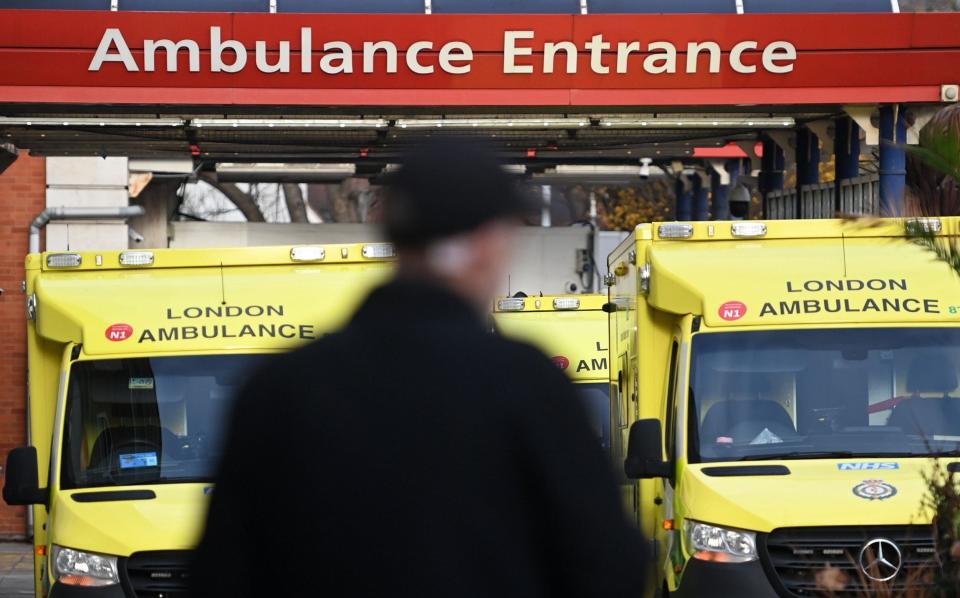Elderly who fall at home unlikely to get an ambulance during strikes

Elderly patients who fall at home face being left without an ambulance when paramedics and 999 call handlers go on strike this month, NHS sources have warned.
Unions have announced nationwide industrial action at ambulance trusts for Dec 21 and 28 – their largest strike for 30 years.
They have said “life and limb” cover will be provided during any action, but have yet to confirm exactly what this will entail. However, The Telegraph understands that older people who suffer falls are unlikely to be included.
Emergency calls deemed to be category one – people with life-threatening illnesses or injuries – or category two, emergency calls, are expected to be prioritised.
Patients in category three, usually how falls are classed, and category four are unlikely to be sent an ambulance during the strikes.
An NHS source said: “Without a clear agreement that they should be exempt, elderly patients who have called an ambulance following a fall could be left waiting longer or not be responded to at all during the strike period as they wouldn’t typically be included under category one and two calls.”
“We’ve got the system of category one, category two, which says these are the life threatening illnesses – but if it was my mum who lived 70 miles away from me, who called an ambulance on a strike day and I was 70 miles away, the niceties of a category one call would be completely lost on me.”
On Tuesday, Number 10 refused to deny that Rishi Sunak, the Prime Minister, was concerned patients would die during the strikes.
Saying that it would not be helpful to “speculate”, Mr Sunak’s official spokesman added: “I think what our focus is now is on mitigating any potential detrimental impact these strikes could have.”
It comes as the country braces for a month of strike action, with up to 100,000 nurses walking out on Dec 15 and 20.
Christmas travellers can expect chaos after Mick Lynch, the RMT general secretary, confirmed that talks had broken down ahead of a deadline to avoid next week’s disruption. Industrial action across the rail network is planned for Dec 13, 14, 16, 17 and 24-27.
People going abroad for a festive break face a fifth of holiday flights being axed as Border Force staff prepare to strike over pay from Dec 21. Bosses at the Public and Commercial Services union will on Wednesday announce strike dates for 15,000 Border Force, passport and visa staff over Christmas.
The Government has put 600 military personnel and hundreds more civil servants on standby to be dispatched to airports and ports to plug gaps left by striking workers.
However, industry chiefs warned that even with military and Whitehall reinforcements, flights may have to be cancelled to avoid unsafe queues building up in airports.
“We may need to reduce the demand at ports and airports alike down to 70 per cent to 80 per cent of normal levels,” said a senior aviation source.
On Tuesday night, Nadhim Zahawi, the Conservative Party chairman, accused Sir Keir Starmer, the Labour leader, of being “spineless” for refusing to criticise strikes.
It came after new data published by the Electoral Commission showed that Labour received over £1.6 million from unions in the third quarter of this year, including from Unite, Unison and GMB, who represent striking ambulance workers.
Mr Zahawi said: “Spineless Keir Starmer refuses to condemn militant strikes wrecking Christmas because he’s in hock to his union baron paymasters propping up the Labour Party’s coffers.”
A Labour spokesman said: “The Labour Party has a broad funding base, with the largest proportion coming from our members and small donors. Labour doesn’t support industrial action that disrupts the public.”
Ambulance workers have voted for strike action over the Government’s four per cent pay award amid soaring inflation, which currently stands at 11 per cent.
All three unions, representing around 25,000 ambulance workers, will walk out in a coordinated strike on Dec 21. The action will involve paramedics, call handlers and emergency care assistants at 10 of the 11 trusts in England and Wales
A further strike by members of the GMB union at nine trusts will take place on Dec 28. The timing of the walkouts will vary between each union and ambulance service, with some on strike for 24 hours.
Union leaders will meet with NHS England and industry associations to agree which types of emergency call they will still respond to. This is likely to include cases such as heart attacks, strokes and sepsis.
It is also understood that unions could push for a reduced number of ambulances to be available at each station. It would then be down to trusts to decide where to send those vehicles during the strike.
MPs said providing only a “skeleton service” during the ambulance strikes could discourage patients from seeking help.
Caroline Abrahams, the charity director at Age UK, said: “The news that ambulance services are to strike in some areas will be extremely destabilising for many older people, because knowing there’s a functioning NHS safety net there for them if something bad happens helps give them confidence to live independently at home.
“It is the responsibility of all the parties, including the Government, to urgently get round the table and secure a settlement for this dispute so these strikes don’t happen.”
Bob Blackman, the Conservative MP for Harrow East, warned that prioritising patients during strike action would be “very difficult”.
“On a personal level, I have had the scenario of my mother-in-law falling over and being on the floor for hours, waiting for an ambulance – and that’s without any strikes,” he said. “That is completely unacceptable. You are almost condemning people to death by this sort of approach.”

